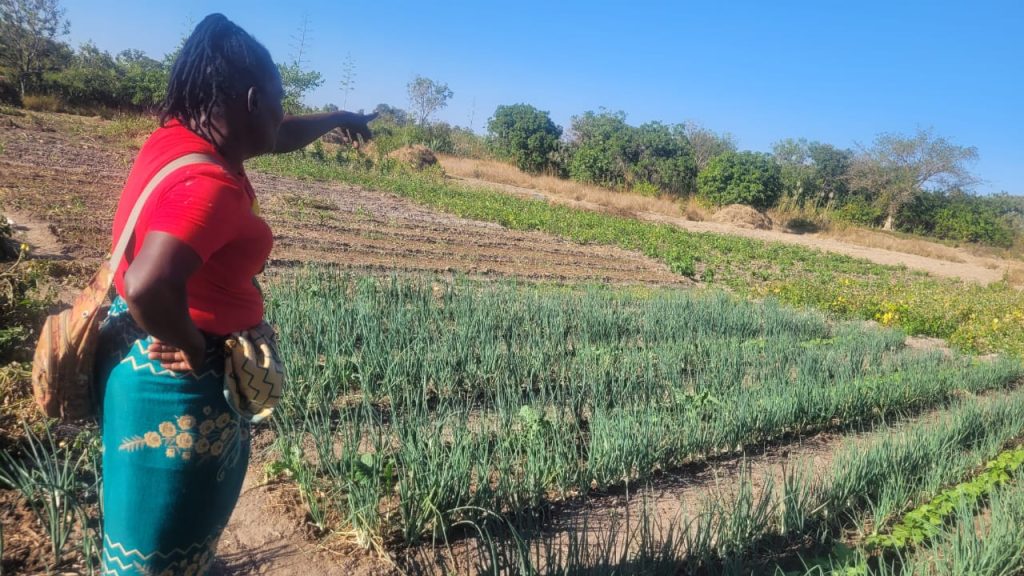By Lloyd Rabaya
The scorching sun’s rays cut through the mango tree branches in Taurai Chikaka’s garden in Zvimba, about 95km northwest of Harare — a garden thriving with life thanks to her adoption of agroecology, a farming method that works with nature, not against it.
Adjacent to the tree are sweet potato beds nestled between expansive drains that help collect and retain water, ensuring the soil stays moist during dry periods.
The left side of the entrance is covered by lush green leaves of various crops like onions, vegetables, beans, and a grove of banana trees — a vibrant display made possible by agroecological methods that promote soil health and biodiversity.
“The trees provide fruits that I can eat and sell, and leaves, which I use in making compost. Before I plant, I put manure from the compost. I practice agroecology,” said the 39-year-old.
Compost is decomposed organic material made from organic waste such as vegetables, dried leaves, and grass, which break down over time. It enriches the soil by providing essential nutrients to plants, improve soil structure, and increasing moisture retention.
According to the United Nations (UN) Food and Agriculture Organisation (FAO), agroecology is a farming approach that combines ecological and social principles to create sustainable food systems. It seeks to optimise interactions between plants, animals, humans and the environment for sustainable and environmentally friendly food agricultural systems.
Chikaka and her family started their agroecology journey in 2021 after being introduced to the Zimbabwe Smallholder Organic Farmers Forum (ZIMSOFF) by a neighbour. Joining ZIMSOFF, to her, was a game-changer.
“Before I embraced agroecology, I used to burn the grass and the remnants of maize in the field. But for the past four years, I have been using them to feed my livestock and to make composts,” she said.
She makes the compost under a tree as the shade helps in moisture retention, which speeds up decomposition.
“Over the years, I have learnt a lot of agroecology techniques and won some garden tools and a solar pump from the yearly competitions we do under ZIMSOFF. These tools have significantly enhanced my farming practices because with them it is easier to make compost, and build,” she said.
Chikaka implements other agroecological farming techniques, including crop rotation, intercropping and water harvesting. Her garden has 14 shallow wells — some hand-dug with help from neighbours — that she regularly maintains by clearing silt and reinforcing the walls. They can sustain their crops throughout the year, even without substantial rain.
“The wells make it easier to water my plants as each well sufficiently serves the portion closer to it. The water pump I received from ZIMSOFF has enhanced my farming because it has alleviated the labour,” she highlighted.
For Chikaka, agroecology has given her what experts call food sovereignty: the power to decide how she grows, harvests, and uses food in ways that align with her cultural values and her environment. It includes the right to access and produce safe, nutritious, and culturally relevant food using available resources.
Occasionally, she intercrops onions with vegetables, tomatoes, beans, and traditional grains like millet (zviyo). In growing these, Chikaka eschews synthetic fertilizers, opting for organic waste from her livestock.
This has allowed her to do her farming and even feed her family on a shoestring budget.
Rather, she now earns a living from farming, which is her way of life.
“I am currently building a four-roomed house, which is now on window-level, with proceeds from farming. I usually sell my produce at Norton business centre, but locals here also prefer my organically grown vegetables,” she added proudly.
Chikaka has managed to send her children, her grandchild, whose parents are now deceased, and her divorced and unemployed brother’s four children to school through farming. She teaches all of them sustainable farming.
In her village, Chikaka is now an inspiration and purveyor to many. After being amazed by her nutritious farming produce, many villagers have come forward to inquire how Chikaka does it.
“I have managed to convince a lot of farmers to start practicing agroecology by telling them the advantages. They also see the benefits from my livelihood,” she added.
Chikaka is now focused on increasing her yield to ensure that she has enough for her family and to continue selling to the community organically grown and healthy food crops, that are more profitable.
“I sell a bucket of millet for US$35 and a bucket of maize for US$4. This year I want to increase the portion for finger millet, pearl millet and Svoboda as well as peanuts and beans,” she said.
Academic at Marondera University of Agricultural Sciences and Technology, Dr Witness Kozanai dovetailed with Chikaka and reiterated that agroecology is multifaceted as it mitigates the impacts of climate change while providing nutritious food to people.
“Above all, it saves and enriches biodiversity through the use of certain principles of production such as non-use of (detrimental) agrochemicals and growing of farmer saved seeds, recycling of resources, pushing climate justice issues and above all, promoting a food system that is healthy and just to the consumer and farmer respectively,” he posited.
However, like most smallholder farmers, Chikaka’s journey is not one without challenges. Due to financial constraints, Chikaka has not been able to fully finance her farming and usually finds it difficult to fully secure her garden.
“Part of the garden is not fenced, so cattle and goats can invade the garden and destroy. To secure the garden, I come early morning and leave in the evening. When I go the market in Norton, my husband takes the task,” said Chikaka.
Norton is about 80km from where she stays, and sometimes Chikaka finds it difficult to go regularly as she always has to hire transport. In winter, the weather makes it difficult for the solar-powered pump to work.
“Sometimes, I will have to use the watering cans because the pump will not be working due to cloud cover. I will have to find an electrical engine,” she added.
ZIMSOFF Programs Officer Patience Shumba highlighted that agroecology is empowering women in various ways and significantly improving their livelihoods. This reduces women’s dependency on men and Gender-Based Violence (GBV).
“Agroecology forges new paths towards financial stability and self-sufficiency and self-reliance. Through agroecology, women can diversify their crops, and yield improves. With this diversification, not only do they enhance food security, but it also provides a platform to sell their produce,” she said.
Consequently, Chikaka’s practices are in tandem with UN Sustainable Development Goals (SDGs) 2, 3, 13 and 15 that call for Zero Hunger, good health and well-being, climate action and promoting sustainable use of ecosystems, and preserving biodiversity for a flourishing life on land.
A representative of Headman Dununu, praised agroecology as it has uplifted people’s livelihoods in the area. He highlighted that agroecological practices follow the traditional way of farming, which is not harmful to the soil and environment at large.
“Agroecology farmers in this area are showing us they way to end hunger. Even in the field, we can always plant something because their practices do not have any costs like buying seed and fertilizers.
Traditionally, we have ways of feeding the soil and having such knowledge being shared from farmer to farmer for free is very essential,” he said.
FAO reports that,” Approximately 80% of women live in the communal areas where they constitute 61% of the farmers provide 70% of the labour. Thus, the work of women farmers is essential for food security.”
Despite facing various challenges and inequalities, women in Zimbabwe are the backbone of agriculture, contributing significantly to food production.




